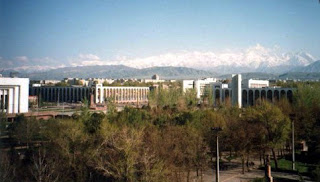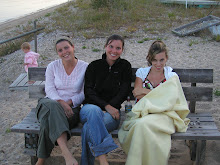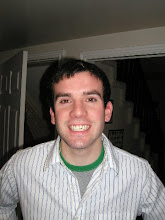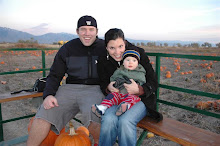 the Tian Shan Mountains in Kyrgyzstan
the Tian Shan Mountains in KyrgyzstanLast night on the Metro coming home, I couldn't help watching a young man, clearly of Central Asian stock, holding a train ticket. The ticket was immediately recognizable--by its pale orange and white coloring and by the gold reflective seal in one of its corners --as a Russian National Railway ticket. I have held several of these types of tickets myself when I've traveled long distances within Russia and most often as I travel to Finland and back. So, I was rather sure that this young man was getting ready to travel somewhere rather far.
Both the young man with the train ticket and I were standing in the corner of the Metro car as all the seats were taken. I was tired from my long day of teaching and was holding the metal railing and listening to NPR or maybe just some music on my iPod. As I listened and tried to mind my own business, I kept glancing over at the young man as he pulled the ticket out of its plastic cover and examined it--as he held it close to his face and read the block lettering on it.
The Metro came to a stop at the station before my own and several seats opened up. I sat down and the young man with the ticket sat next to me. I sorta tried not to watch as he continued to read and re-read his ticket. He ran his fingers across the paper and turned it over and read the small print on the backside--all the terms and conditions. When he turned it over again, I stole a quick glance at the destination. Bishkek, Kyrgyzstan.
 Bishkek the capital of Kyrgyzstan
Bishkek the capital of Kyrgyzstan
Before I continue maybe I should talk a little bit about Moscow and the people who make up a sizable portion of the city's various manual and labor-intensive workforces.
First of all, many Russians are fond of saying "Moscow is not Russia." What they mean is that Moscow is a different world--socially, culturally and most significantly economically--than the rest of Russia. In Moscow the average salary is really comparable--and in some instances better--than the average American salary. What you pay for lunch here is basically what you are gonna pay in New York--sometimes more. What you pay for an apartment here is basically what you are gonna pay in New York--sometimes more. Everywhere you look there are cranes and rising concrete and steel buildings. This just isn't true for the rest of Russia. In fact, the difference in salary and development between Moscow and the rest of Russia--and the rest of the former Soviet Union--is pretty staggering.
Moscow is booming (or was--we'll see what happens with this crisis) and there is work to be done and money to be made. So to Moscow from all of Russia and beyond flock those looking for work. Particularly visible-- among the construction workers, the street cleaners, the janitors and floor buffers at shopping centers, the restroom attendants, the buss boys and kitchen girls--are people from Central Asia--the former Soviet Republics of Kazakhstan, Tajikistan, Uzbekistan, Turkmenistan and Kyrgyzstan.
Many Russians are quick to point out that there is no racial discrimination in Russia--the Soviet Union was a united nation of many peoples and ethnicities-- but those same people are equally quick to laugh at jokes that are less than kind in their portrayal of "Tajiki" or "Kazakhi" and to point out how much the influx of Central Asian laborers--legal and illegal--has lowered the average salary.
If I had to find an analogous phenomenon in the US, I would point to the many workers from Mexico and other countries of Latin America who provide so much of the labor that keeps America going. In fact, if you want a shorthand for understanding the way Central Asians are treated and seen here in Moscow, just take a moment and think of the views and opinions expressed concerning your Mexican American neighbors. Of course, there are many details and specifics which differ, but I find myself feeling similarly about the plight of the Central Asian Laborers here in Moscow as I do about the Mexican Immigrants back home.
New Years is
the holiday in Russia. A big 10 day holiday is coming up and as I sat next to this young Central Asian fellow holding his ticket--presumably back home--I, maybe rather romantically, began to imagine his family meeting him at the station in Bishkek. I began to picture his mother-- who probably sent him off to Moscow from the same station--smiling and hugging him as he got off the train. I wondered if he was bringing his family back in Kyrgyzstan presents or money. Maybe he had a girlfriend or wife back in Kyrgyzstan. I wondered, was he going home just for the holiday or was he going home to stay? I looked at his hands holding the ticket and guessed at his own feelings about going home. Was he excited? Did he miss Kyrgyzstan? Maybe he was going home out of an obligation? Maybe he wanted to stay in Moscow? He held the ticket up to his face again and ran his finger across the gold seal and I decided that he was excited to be going home.
Of course, I could have been entirely wrong. I was clearly projecting onto this young man my own imaginings and fantasies. I was myself playing into racial and ethnic stereo-types. The whole narrative I'd created for this young man could have been utterly wrong. He could have very well been born and raised in Moscow, he could have been a young rising executive at a bank and was simply visiting Kyrgyzstan for pleasure. He could have bought the ticket for a friend...anything...who knows.
But, as I sat there next to him, I suddenly felt an unexpected kinship with him--or maybe just with the man I imagined he was. He and I were a like in many ways--that man. We were both working here in this big strange city hundred and hundreds of miles away from our families and loved ones. We were both foreigners who had come to another country for work that we somehow needed and now here--in Moscow--we were both subject to the opinions and perspectives of those we worked for and among. I considered how different our respective jobs might be and I also acknowledged that, perhaps, the opinions and perspectives which we daily encountered were also probably quite different.
Still....I thought and I remembered an incident that happened last week. There is some construction and remolding work being done in the building where my company's office is. One evening last week, as I was leaving the office, I was stopped in the dusky light by two police officers asking to see my documents. I showed them my Passport, Registration and Work Visa but they insisted that I needed an additional Work Permit ID Card. When I informed them that I didn't need a Work Permit ID Card because I was a teacher and by law my Work Permit was held by my employer and that I only needed to carry my Work Visa, the retorted that they didn't know of any such law and insisted that I needed a Work Permit ID Card. I said, well that's not my understating and I didn't have a Work Permit ID Card. One of the officers stomped over to group of young men standing a few feet off. I quickly noticed that this group was made up entirely of--what appeared to me to be--young Central Asian-looking men. The officer spoke to one of the young men and I saw the young man hand him a small card. The officer returned and in his hand he held a Work Permit ID Card and told me that I needed "one of these". At just this moment, my boss Yulia appeared and the problem was eventually solved--but not without a lot of huffing and puffing and posturing and squirming from the officers. They were quite disappointed. You see, they were hoping to get a little cash. That's how it works here. If you get stopped by a traffic officer--he doesn't want to give you a ticket--he wants 1000 rubles ($35). The construction happening in the building, no doubt, drew the officers to the site in hopes of finding some undocumented workers and some cash.
It made me mad--this incident--with the police officers. What right did they have to stand out there and wait for me and try to get a bribe off a poor American teacher? I was here legally and was providing a necessary service. I thought of the thousands of workers from Central Asia who were also here in Moscow working hard--building this city and cleaning its streets and washing its bathrooms and wiping clean its restaurant tables and buffing its shopping center floors all glossy and bright. I thought of all of these men and women from Central Asia who probably didn't have a boss like Yulia who would come rushing out to their aid when the police officers stopped them. I thought of their families back in Kyrgyzstan and Turkmenistan and Tajikistan--only a border away from Afghanistan--who most likely depended on the money they sent or brought home.
I thought of the millions of men and women in the United States from Mexico and from Latin America and from Asia and from Africa and from all over the world who were working hard and long days and nights to try to make a living and support their families.
I thought of my own ancestors--Irishmen on boats coming to New York and Boston--working in the slums of those 19th century American cities. I thought of them hungry and brave and strong and full of hope and struggle. I thought of them moving west to Michigan to work and work and marry and marry and bear children and more children and eventually me-- here in Moscow working next to a young man from Kyrgyzstan waiting with an orange and gold ticket back home for New Years...
The Metro came to a stop. Molodozhnaya. My station. I got up and exited and I noticed that the young man with the train ticket exited as well. I turned right to leave the station and he turned left and disappeared into the Moscow winter night and into the crowd. I was still thinking of his holiday train ride home and his waiting family as I walked the 10 minutes to my apartment building--wishing him well and wishing that I too was going to see my family back home.
 Kyrgyzstan... pretty huh?
Kyrgyzstan... pretty huh?
learn more about Kyrgyzstan here:
http://en.wikipedia.org/wiki/Kyrgyzstan


















.jpg)